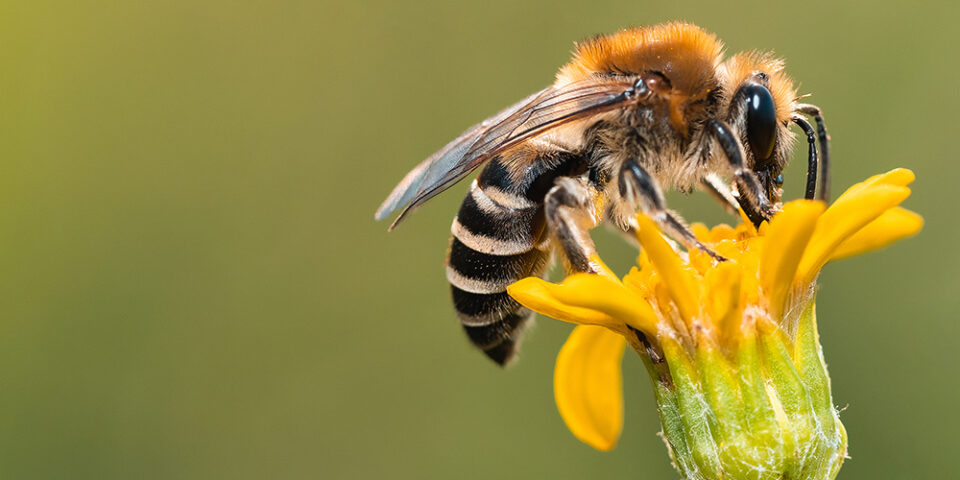What to do about a bee sting
Encountering a bee or wasp sting can be an unpleasant and potentially dangerous experience for anyone. While most stings cause mild discomfort and can be managed at home, it’s crucial to know the right steps to take in case of an emergency. Urgent care provider Daniel Brake, MD, shared valuable insights on how to handle bee and wasp stings effectively, both for adults and children, and explained how to recognize and respond to allergic reactions.
What should you do if you’re stung by a bee or wasp?
“Assuming you’re not allergic, your first step when dealing with a bee sting or wasp sting is going to be to remove the stinger,” said Dr. Brake. “When a honeybee stings you, it leaves the stinger behind. Use a credit card, your fingernail or another straight-edged object to remove it as quickly as possible. Avoid using tweezers – the squeeze can actually cause the stinger to release more venom.”
After the stinger is out, wash the area with soap and water to reduce the risk of infection, apply a cold pack or ice wrapped in cloth to cut down on pain and swelling and take over-the-counter, non-prescription pain relievers like ibuprofen or acetaminophen. Not only can these pain relievers help with the lingering discomfort, they also help to calm inflammation. If you experience any signs of an allergic reaction, seek emergency care as soon as possible.
Is treating a bee sting different for children?
“For children, the treatment is generally the same as for adults,” said Dr. Brake. “However, it’s essential to closely monitor children after a sting, especially if it’s their first time being stung, or they have a known allergy.”
Both children and adults can develop allergic reactions to bee or wasp stings without prior symptoms or warning, so it’s important to know what to watch for and when you may need further care for the sting.
How do you know if you’re allergic to a bee sting or wasp sting? What should you do if you are allergic?
“Allergic reactions to bee or wasp stings can range from mild to severe and can develop even if you’ve been stung without issue before,” said Dr. Brake. “Even if previous allergic reactions occurred and were mild, don’t assume they always will be. They could become more severe.”
Symptoms of an allergic reaction include:
- Severe swelling beyond the sting site
- Hives or itching in areas away from the site of the sting
- Difficulty breathing
- Wheezing
- Swelling of the tongue or throat
- Dizziness or fainting, changes in consciousness
- Rapid pulse or heart palpitations
- Nausea or vomiting
If you experience any of these symptoms after being stung, seek immediate emergency medical attention by either calling 911 or heading to your nearest ER. Severe allergic reactions like anaphylaxis, in which airways become obstructed and the person affected cannot easily breathe, can be life-threatening. Prompt treatment with epinephrine may be needed as soon as possible and with medical supervision.
What should you do if you encounter a swarm of bees or wasps?
“If you encounter a swarm of bees or wasps, it’s crucial to remain calm and avoid making any sudden movements or loud noises that might agitate them,” said Dr. Brake.
He recommended following these steps:
- Slowly and quietly walk away from the area without swatting at the insects
- Seek shelter indoors or inside a vehicle if possible
- Do not jump into water – bees and wasps may simply wait for you to come back to the surface
- If you are stung multiple times or notice symptoms of an allergic reaction, seek immediate medical attention
How can you prevent bee stings and wasp stings?
“One important tip for preventing bee stings is to keep a close eye on your house and property,” said Dr. Brake. “Regularly check covered porches, carports, garages, underneath gutters and along fences, trees and outbuildings for beehives or wasp or hornet nests. If you find any, have them safely removed by a professional.”
Dr. Brake also suggested:
- Avoid wearing bright, colorful clothing or clothes with floral patterns, as they can attract bees and wasps
- Don’t use scented lotions, perfumes or hair products when spending time outdoors
- Keep your food and drinks covered when eating outside
- Be cautious around garbage cans and sweet-smelling compost bins
- Wear closed-toed shoes, long sleeves and pants for added protection when gardening, hiking or working outdoors. This can also help prevent tick bites.
“Remember, if you suspect an allergy or if you experience a severe reaction to being stung by an insect, seek emergency medical attention or visit an urgent care location immediately,” said Dr. Brake. “As a physician, I cannot emphasize enough how important it is to get care promptly in the event of an allergic reaction. If you’re not sure if what you’re experiencing is an allergic response to a bee sting or not, urgent care physicians can help you with initial treatment and knowing what to do next, especially if you are stung outside of the usual doctor’s office hours or on the weekend.”
Prisma Health Urgent Care
Get walk-in or virtual care for a wide range of non-life-threatening conditions. Available seven days a week.
Get Care

